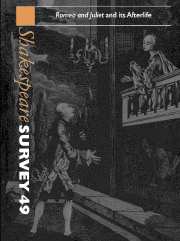Book contents
- Frontmatter
- The Challenges of Romeo and Juliet
- The Date and the Expected Venue of Romeo and Juliet
- The ‘Bad’ Quarto of Romeo and Juliet
- Shakespeare’s Romeo and Juliet: The Places of Invention
- ‘Death-marked love’: Desire and Presence in Romeo and Juliet
- Carnival and Death in Romeo and Juliet: A Bakhtinian Reading
- Ideology and the Feud in Romeo and Juliet
- Bawdy Puns and Lustful Virgins: The Legacy of Juliet’s Desire in Comedies of the Early 1600s
- Picturing Romeo and Juliet
- Nineteenth-Century Juliet
- ‘O, what learning is!’ Pedagogy and the Afterlife of Romeo and Juliet
- The Film Versions of Romeo and Juliet
- The Poetics of Paradox: Shakespeare’s Versus Zeffirelli’s Cultures of Violence
- ‘Lawful deed’: Consummation, Custom, and Law in All’s Well That Ends Well
- ‘Have you not read of some such thing?’ Sex and Sexual Stories in Othello
- French Leave, or Lear and the King of France
- The Actor as Artist: Harold Hobson’s Shakespearian Theatre Criticism
- Shakespeare Performances in England, 1994–1995
- Professional Shakespeare Productions in the British Isles, January-December 1994
- Critical Studies
- Shakespeare’s Life, Times, and Stage
- Editions and Textual Studies
- Books Received
- Index
French Leave, or Lear and the King of France
Published online by Cambridge University Press: 28 March 2007
- Frontmatter
- The Challenges of Romeo and Juliet
- The Date and the Expected Venue of Romeo and Juliet
- The ‘Bad’ Quarto of Romeo and Juliet
- Shakespeare’s Romeo and Juliet: The Places of Invention
- ‘Death-marked love’: Desire and Presence in Romeo and Juliet
- Carnival and Death in Romeo and Juliet: A Bakhtinian Reading
- Ideology and the Feud in Romeo and Juliet
- Bawdy Puns and Lustful Virgins: The Legacy of Juliet’s Desire in Comedies of the Early 1600s
- Picturing Romeo and Juliet
- Nineteenth-Century Juliet
- ‘O, what learning is!’ Pedagogy and the Afterlife of Romeo and Juliet
- The Film Versions of Romeo and Juliet
- The Poetics of Paradox: Shakespeare’s Versus Zeffirelli’s Cultures of Violence
- ‘Lawful deed’: Consummation, Custom, and Law in All’s Well That Ends Well
- ‘Have you not read of some such thing?’ Sex and Sexual Stories in Othello
- French Leave, or Lear and the King of France
- The Actor as Artist: Harold Hobson’s Shakespearian Theatre Criticism
- Shakespeare Performances in England, 1994–1995
- Professional Shakespeare Productions in the British Isles, January-December 1994
- Critical Studies
- Shakespeare’s Life, Times, and Stage
- Editions and Textual Studies
- Books Received
- Index
Summary
Most of the variants between the two texts of King Lear can be explained as cuts or expansions; those who think the Quarto is the better text see the Folio as weakening Shakespeare’s intentions; those who think the Folio is a revision, possibly by the author, of the Quarto see the Folio as improving on the Quarto. The larger changes, as represented in the 300 or so lines found in the Quarto but not in the Folio, and the 100 or so lines found in the Folio but not in the Quarto, appear to be purposeful, but in the absence of external evidence debate continues about the nature of the purpose, and whose purpose is in question. Allowing for possible errors by printer or scribe, minor corrections or sophistications, and possible indifferent variants such as ‘vncleane’ (Q) or ‘vnchaste’ (F; 1.1.223) and ‘respects’ (Q) or ‘regards’ (F; 1.1.234), the majority of the smaller changes also seem to be purposeful, and like the larger cuts or additions, may be regarded as modifications of the Quarto in the Folio. The basic structure of the play remains the same in both texts, and ‘virtually no speech of any length seems to have been either wholly reworked or replaced by a different one’. There are one or two places, such as the scene of the duel between Edgar and Edmund, and the ending with the death of Lear, both in 5.3, where the dramatic action is radically altered, but the only substantial speech that appears to offer two different versions in Quarto and Folio is Kent’s general commentary on the state of affairs addressed to a Gentleman in 3.1.
- Type
- Chapter
- Information
- Shakespeare Survey , pp. 217 - 224Publisher: Cambridge University PressPrint publication year: 1996



